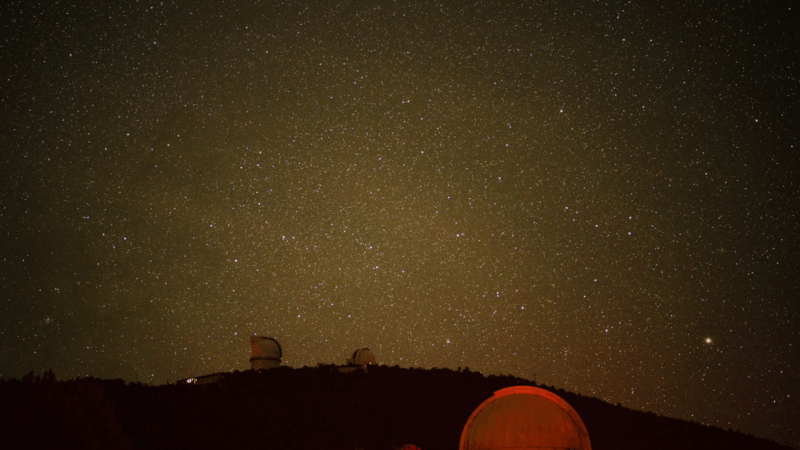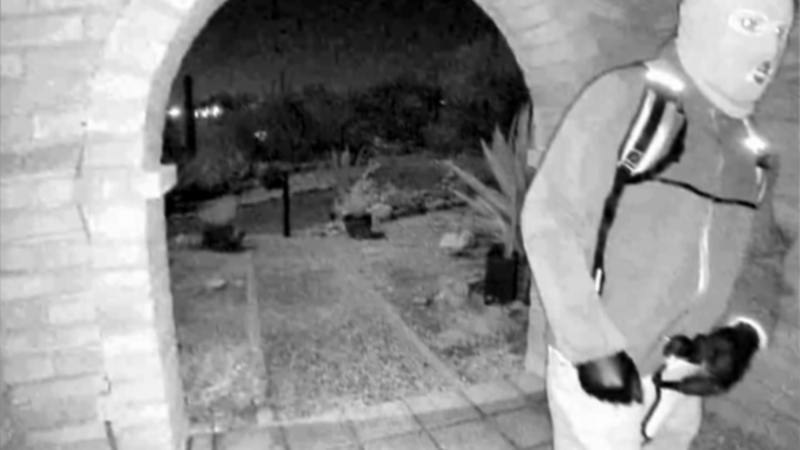As light pollution increases, West Texas works to protect the world’s largest ‘dark sky reserve’
DAVIS MOUNTAINS STATE PARK, TEXAS — It’s a packed night at McDonald Observatory, where dozens of people are crowding around high-powered telescopes as a thunderstorm rolls off to the east.
Locals and visitors from around the country come here to experience a vanishing and free natural resource: some of the darkest nighttime skies in the world.
From the observatory’s perch high up in the Davis Mountains of Far West Texas–some 6,800 hundred feet above sea level–you can see just how far the desert floor stretches out and the nighttime sky almost feels within reach. Under tonight’s starry shroud, couples embrace, heads tilting toward the sky and children skip from telescope to telescope to catch a glimpse of the celestial show.
“It just feels amazing looking up seeing all these different constellations,” said Maya Howitt. The girl is here with her parents, Emma and Cameron Howitt, and the three of them are taking turns looking through a telescope that’s pointed at a pair of stars in the ‘handle’ of the Big Dipper. “I just feel like I’m in a dream whenever I look up here.”

About 75,000 people attend the observatory’s “star-parties” throughout the year and take in the region’s famously dark skies.
“It makes me feel kind of small – not insignificant, but small, just part of this whole cosmos that we live in,” said Cameron Howitt.
Recent research shows the night sky in North America is getting brighter every year – on average, researchers say, you can see about 10 percent fewer stars than the year before. But the Big Bend area in Texas has fended off the light glow that washes out starry nights.

Over the last several years, astronomers and conservationists in the region have worked with cities and counties on lighting ordinances to reduce light pollution. They have also convinced oil and gas operators in the nearby Permian Basin–a major source of light pollution–to also take up dark-sky friendly lighting at drilling rigs and gas plants.
In spring 2022, this region was designated as “dark sky reserve,” meaning it’s an area where not only is the sky dark, but there are policies in place to help preserve the nighttime sky.
Loading…
‘An entire sky shed’
And the reserve here, dubbed the Greater Big Bend International Dark Sky Reserve, is the largest of its kind in the world. The reserve is a 15,000 square mile stretch over the entire Big Bend area and a ribbon of northern Mexico – an area larger than Massachusetts.
“We’re protecting an entire sky shed,” said Stephen Hummel, the dark skies coordinator at McDonald Observatory, which is managed by the University of Texas. “You can stand in the middle, and everywhere as far as you can see along the horizon is still part of the Dark Sky reserve.”
Hummel says the reason why it’s important for the observatory to preserve the nighttime sky is pretty straightforward: you can’t study the stars if you can’t see them.

“If we lose the night sky completely, it’s like losing a natural history museum’s worth of information,” said Hummel, who grew up in the Dallas-Fort Worth area under, what he calls, a “light-polluted sky.”
“If we can’t preserve the dark skies here that’s kind of it. There’s really nowhere else we can go on earth now to really be sure we’ll have a good view of the night sky.”
And that “good view” isn’t just a boon to research, but the dark skies are important to the local economy and crucial to the environment and wildlife too.
But for all its benefits, protecting the dark sky isn’t without its hurdles.
Amber Harrison, with DarkSky International, a non-profit organization based in the U.S., says some people believe having a dark sky means not having any light.
“We are not talking about turning off lighting,” says Harrison, who lives in one of the darkest pockets of the reserve. “Lighting is not a bad thing, it’s the way that we use it.”
That means out here, you’ll see amber-tinted lights and hooded fixtures that keep light on the ground – which, along with other efforts, go a long way in maintaining the darkness of the night sky.
A starry way of life
At a star party in Alpine, Texas, local musicians belt out songs as eager stargazers, like Jodie Kramer, spread blankets over the crunchy desert grass.


This region, from Alpine and Fort Davis to Marfa and Terlingua, takes pride in its designation as a dark sky reserve. The courthouse in Alpine is lined with fixtures that mitigates light pollution, murals off that city’s main thoroughfare depict wildlife resting in the comfort of a dark sky. In Marfa, people can check out a telescope from the public library, and it’s not uncommon for people here to drive out on rural country roads to do their own stargazing.
“The dark sky is just something that just not everybody gets to experience,” said Jodie Kramer, who’s been to “multiple star parties.”
The region’s starry skies is what attracted Kramer and her husband, Alan, to this remote area.
The two are from the Houston area, where Jodie Kramer says “you hardly get to see the stars.”
After a vacation to the Big Bend, they fell in love with the area, and now they can regularly see celestial wonders like the Milky Way from their home’s front yard in Fort Davis.
“We came out here because it’s our happy place, there’s something magical about it,” said Jodie Kramer.
“I mean there’s nothing like it.”

Top 5 takeaways from the House immigration oversight hearing
The hearing underscored how deeply divided Republicans and Democrats remain on top-level changes to immigration enforcement in the wake of the shootings of two U.S. citizens.
Snowboarder Chloe Kim is chasing an Olympic gold three-peat with a torn labrum
At 25, Chloe Kim could become the first halfpipe snowboarder to win three consecutive Olympic golds.
Pakistan-Afghanistan border closures paralyze trade along a key route
Trucks have been stuck at the closed border since October. Both countries are facing economic losses with no end in sight. The Taliban also banned all Pakistani pharmaceutical imports to Afghanistan.
Malinowski concedes to Mejia in Democratic House special primary in New Jersey
With the race still too close to call, former congressman Tom Malinowski conceded to challenger Analilia Mejia in a Democratic primary to replace the seat vacated by New Jersey Gov. Mikie Sherrill.
A daughter reexamines her own family story in ‘The Mixed Marriage Project’
Dorothy Roberts' parents, a white anthropologist and a Black woman from Jamaica, spent years interviewing interracial couples in Chicago. Her memoir draws from their records.
FBI release photos and video of potential suspect in Guthrie disappearance
An armed, masked subject was caught on Nancy Guthrie's front doorbell camera one the morning she disappeared.






